人教版(2019)选择性必修 第四册Unit4 Sharing Learning about language 课件(共27张PPT)
文档属性
| 名称 | 人教版(2019)选择性必修 第四册Unit4 Sharing Learning about language 课件(共27张PPT) | 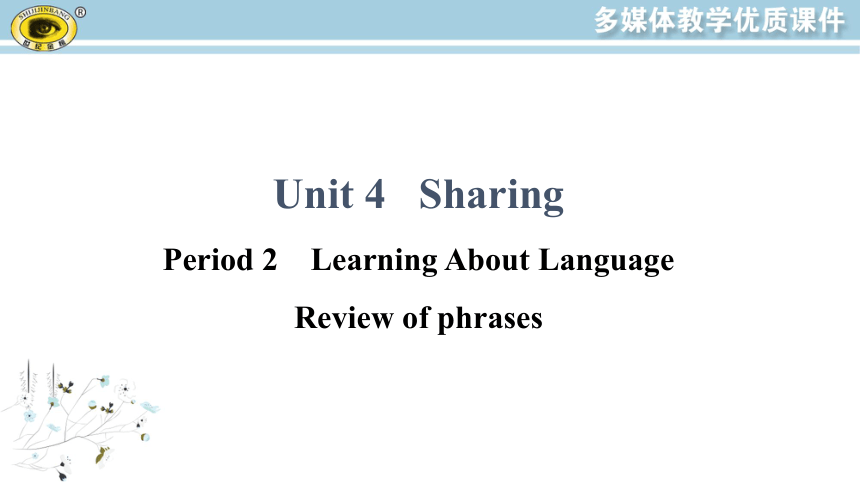 | |
| 格式 | ppt | ||
| 文件大小 | 744.5KB | ||
| 资源类型 | 教案 | ||
| 版本资源 | 人教版(2019) | ||
| 科目 | 英语 | ||
| 更新时间 | 2024-11-18 11:46:32 | ||
图片预览

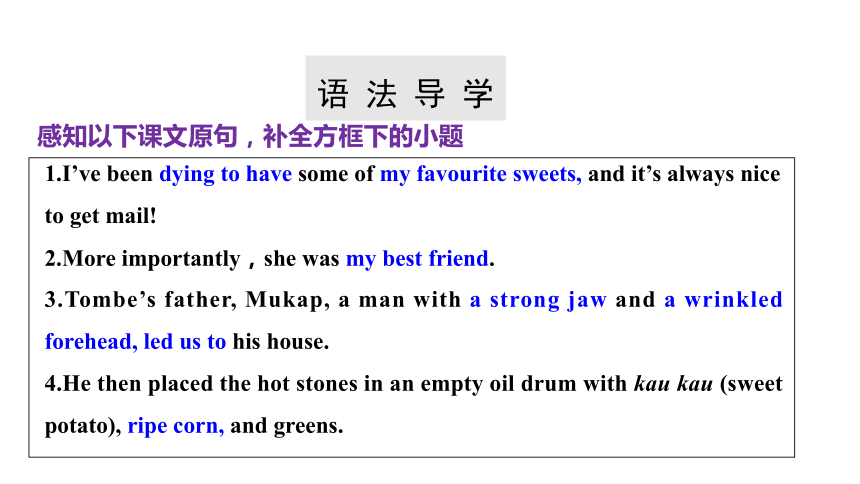
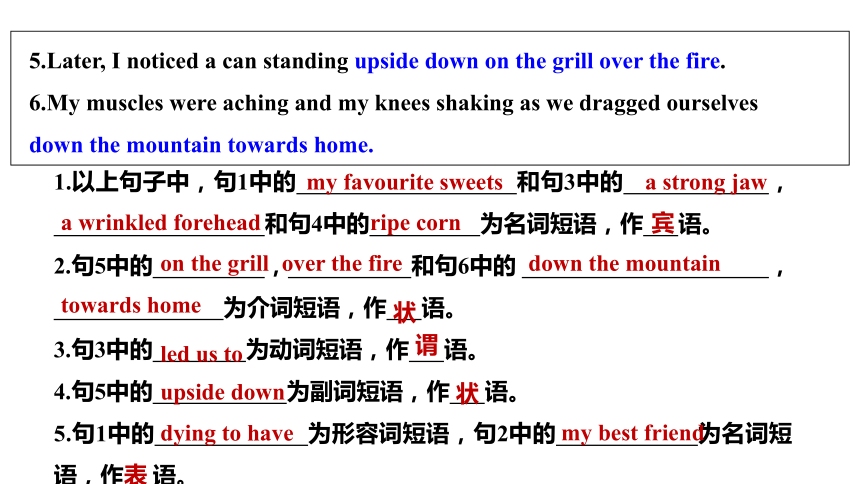
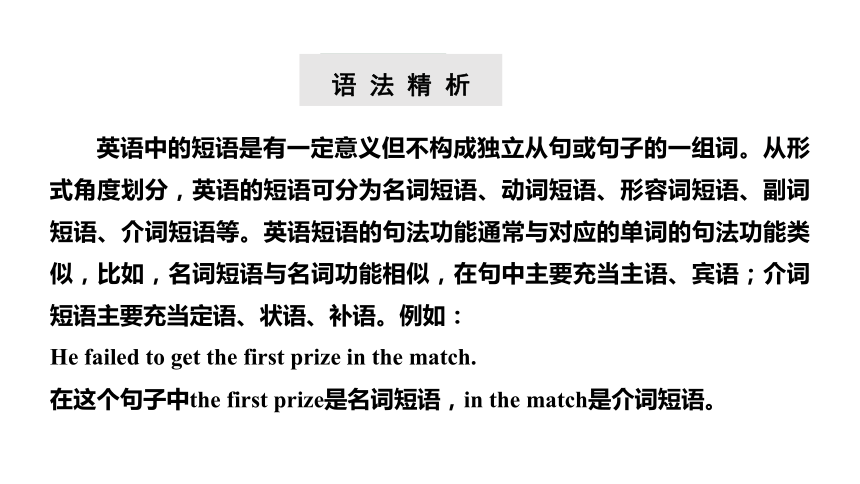
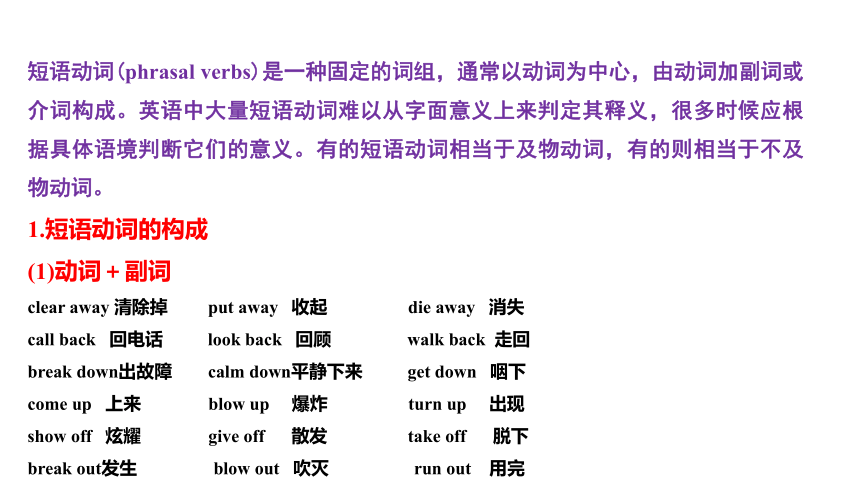
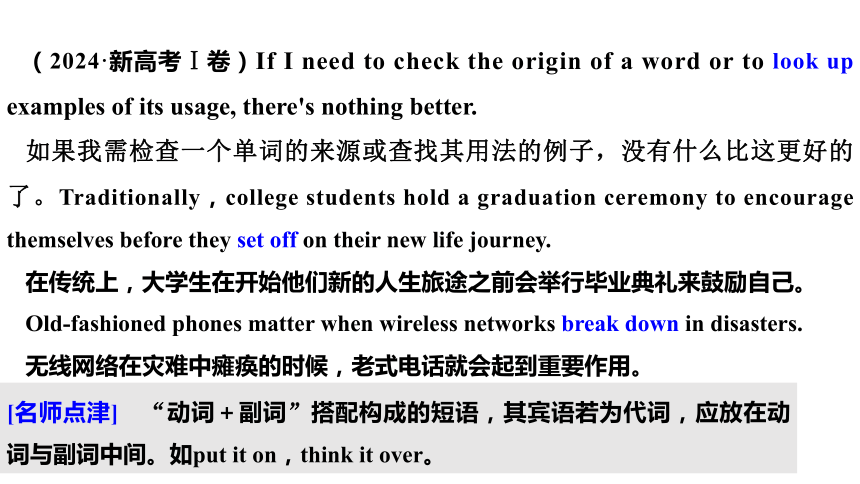
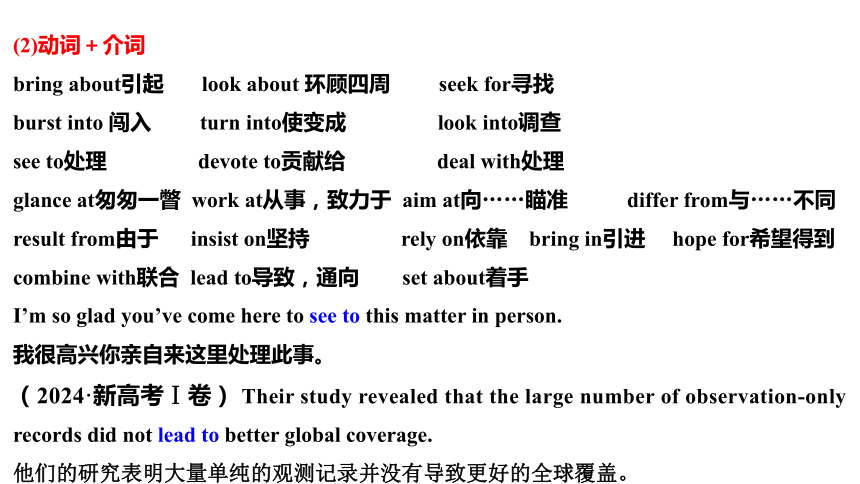
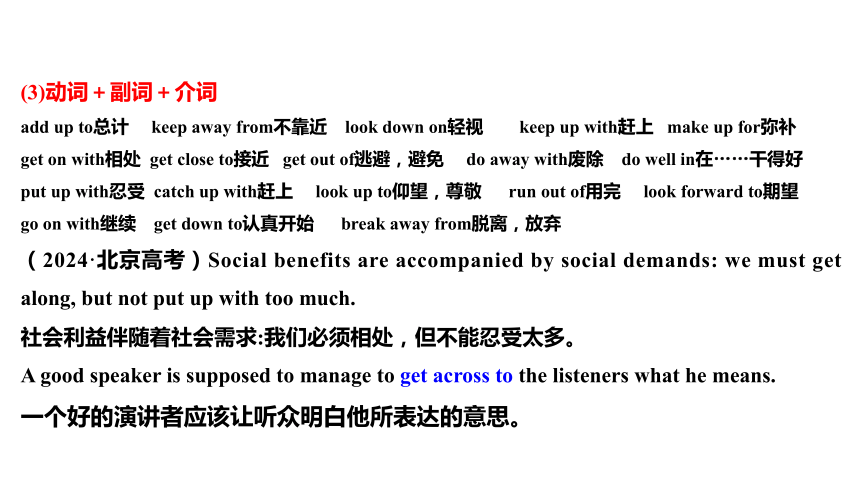
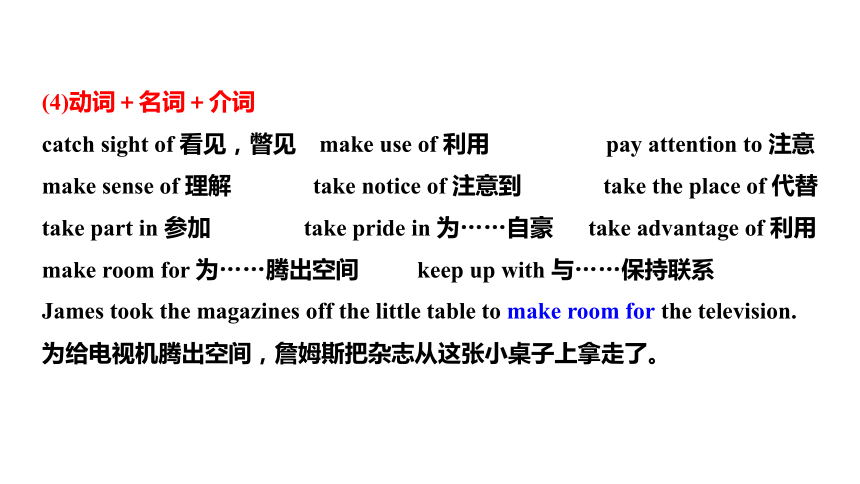
文档简介
(共27张PPT)
Unit 4 Sharing
Period 2 Learning About Language
Review of phrases
感知以下课文原句,补全方框下的小题
1.I’ve been dying to have some of my favourite sweets, and it’s always nice to get mail!
2.More importantly,she was my best friend.
3.Tombe’s father, Mukap, a man with a strong jaw and a wrinkled forehead, led us to his house.
4.He then placed the hot stones in an empty oil drum with kau kau (sweet potato), ripe corn, and greens.
语 法 导 学
5.Later, I noticed a can standing upside down on the grill over the fire.
6.My muscles were aching and my knees shaking as we dragged ourselves down the mountain towards home.
1.以上句子中,句1中的 和句3中的 , 和句4中的 为名词短语,作 语。
2.句5中的 , 和句6中的 , 为介词短语,作 语。
3.句3中的 为动词短语,作 语。
4.句5中的 为副词短语,作 语。
5.句1中的 为形容词短语,句2中的 为名词短语,作 语。
my favourite sweets
a strong jaw
a wrinkled forehead
ripe corn
宾
on the grill
over the fire
down the mountain
towards home
led us to
upside down
dying to have
状
谓
状
表
my best friend
英语中的短语是有一定意义但不构成独立从句或句子的一组词。从形式角度划分,英语的短语可分为名词短语、动词短语、形容词短语、副词短语、介词短语等。英语短语的句法功能通常与对应的单词的句法功能类似,比如,名词短语与名词功能相似,在句中主要充当主语、宾语;介词短语主要充当定语、状语、补语。例如:
He failed to get the first prize in the match.
在这个句子中the first prize是名词短语,in the match是介词短语。
语 法 精 析
短语动词(phrasal verbs)是一种固定的词组,通常以动词为中心,由动词加副词或介词构成。英语中大量短语动词难以从字面意义上来判定其释义,很多时候应根据具体语境判断它们的意义。有的短语动词相当于及物动词,有的则相当于不及物动词。
1.短语动词的构成
(1)动词+副词
clear away 清除掉 put away 收起 die away 消失
call back 回电话 look back 回顾 walk back 走回
break down出故障 calm down平静下来 get down 咽下
come up 上来 blow up 爆炸 turn up 出现
show off 炫耀 give off 散发 take off 脱下
break out发生 blow out 吹灭 run out 用完
(2024·新高考Ⅰ卷)If I need to check the origin of a word or to look up examples of its usage, there's nothing better.
如果我需检查一个单词的来源或查找其用法的例子,没有什么比这更好的了。Traditionally,college students hold a graduation ceremony to encourage themselves before they set off on their new life journey.
在传统上,大学生在开始他们新的人生旅途之前会举行毕业典礼来鼓励自己。
Old-fashioned phones matter when wireless networks break down in disasters.
无线网络在灾难中瘫痪的时候,老式电话就会起到重要作用。
[名师点津] “动词+副词”搭配构成的短语,其宾语若为代词,应放在动词与副词中间。如put it on,think it over。
(2)动词+介词
bring about引起 look about 环顾四周 seek for寻找
burst into 闯入 turn into使变成 look into调查
see to处理 devote to贡献给 deal with处理
glance at匆匆一瞥 work at从事,致力于 aim at向……瞄准 differ from与……不同
result from由于 insist on坚持 rely on依靠 bring in引进 hope for希望得到
combine with联合 lead to导致,通向 set about着手
I’m so glad you’ve come here to see to this matter in person.
我很高兴你亲自来这里处理此事。
(2024·新高考Ⅰ卷) Their study revealed that the large number of observation-only records did not lead to better global coverage.
他们的研究表明大量单纯的观测记录并没有导致更好的全球覆盖。
(3)动词+副词+介词
add up to总计 keep away from不靠近 look down on轻视 keep up with赶上 make up for弥补
get on with相处 get close to接近 get out of逃避,避免 do away with废除 do well in在……干得好
put up with忍受 catch up with赶上 look up to仰望,尊敬 run out of用完 look forward to期望
go on with继续 get down to认真开始 break away from脱离,放弃
(2024·北京高考)Social benefits are accompanied by social demands: we must get along, but not put up with too much.
社会利益伴随着社会需求:我们必须相处,但不能忍受太多。
A good speaker is supposed to manage to get across to the listeners what he means.
一个好的演讲者应该让听众明白他所表达的意思。
(4)动词+名词+介词
catch sight of 看见,瞥见 make use of 利用 pay attention to 注意
make sense of 理解 take notice of 注意到 take the place of 代替
take part in 参加 take pride in 为……自豪 take advantage of 利用
make room for 为……腾出空间 keep up with 与……保持联系
James took the magazines off the little table to make room for the television.
为给电视机腾出空间,詹姆斯把杂志从这张小桌子上拿走了。
2.介词与其他词类的常见搭配
(1)形容词与介词的固定搭配
形容词+at angry,mad,good,bad,clever,surprised,excited,disappointed等
形容词+of afraid,frightened,ashamed,aware,convinced,short,sick,tired,sure,certain,full,fond,proud,worthy等
形容词+with angry,connected,content,familiar,generous,gentle,patient,pleased,popular,satisfied,strict等
形容词+in weak,different,rich,interested,successful,absorbed,disappointed,experienced,confident等
形容词+to good,polite,kind,cruel,rude,close,similar,familiar等
形容词+for sorry,famous,fit,unfit,eager,anxious,hungry,responsible等
形容词
+about sorry,anxious,careless,certain,curious,enthusiastic,particular,optimistic等
(2)名词与介词的固定搭配
名词+to key,answer,visit,apology,introduction,attitude,monument,devotion等
名词+in interest,expert等
名词+on congratulations,effect等
(3)动词与介词的固定搭配
动词+about speak,talk,think,worry等
动词+for answer,call,apply,beg,care,charge,hunt,hope,wish,long,search,seek等
动词+at aim,call,glare,glance,knock,laugh,point,stare等
动词+from date,differ,hear,keep,stop,prevent,learn,protect,result,separate,suffer等
动词+of approve,complain,consist,die,dream,think等
动词+on call,carry,depend,feed,insist,pass,try,rely等
动词+in break,call,cut,drop,fill,get,hand,join,persist,result,succeed等
动词+into burst,change,divide等
动词+to agree,attend,belong,compare,devote,lead,object,point,refer,reply等
3.短语动词使用时须注意的几点
(1)在短语动词中,副词可以放在动词宾语前或后。但是如果宾语是代词,则应放在动词和副词之间。
The young lovers have been trying to put some money aside for their marriage ceremony.
这对年轻的恋人一直努力存钱以备举行婚礼时用。
He has put aside a little money for a rainy day.
他存了一点钱以备不时之需。
When you do not understand a new word,you can look it up in this dictionary.
当你不理解新单词的时候,你可以查字典。
This method is very new and you can try it out to solve the hard problem.
这种方法相当新,你可以试着用它去解决那个难题。
(2)在带有介词的短语动词中,介词的宾语总是紧随其后的。
We have brought in a good harvest for three years.
我们已经连续三年获得了丰收。
We’ve just come across an old friend we haven’t seen for ages.
我们刚碰到了一位多年不见的老朋友。
Please keep away from the scene of the accident before the police come.
在警察来之前,请远离事故现场。
The manager expects everyone to get down to his work after the national holiday.
经理要求大家国庆假期之后开始专心工作。
(3)有些短语动词后并不需要跟宾语,这时它们相当于不及物动词。如:
Mr Wang’s new car broke down and he had to go to work by bike again.
王先生的新汽车坏了,他不得不又骑自行车去上班。
The crowd broke up after the football games.
足球比赛结束后,人们四处散开。
(4)①同一动词,后面跟不同的副词或介词构成意思不同的短语动词。如:
break down 坏了;出故障 break up 拆散;解体;驱散
break in 闯入;插话 break off 忽然停止讲话;断绝
break out 爆发;逃出 break through 冲破;突破;战胜
②不同的动词,后面跟上相同的副词或介词构成意思不同的短语。如:
make up组成;构成;弥补;编造;化妆
show up出席;露面;揭露
hold up举起来;阻塞;耽搁;抑制感情
set up创立;建立;树立;资助
put up提出;举起;建造
take up拿起;举起;开始(某)活动
(5)一些短语动词,具有多种释义,需要根据全句语境对它们作出恰当理解。如:
Hurry up,children!The plane will take off very soon.(起飞)
After entering the room,he took off his coat.(脱下)
The boss told him that he would take two weeks off in November.(休假)
He broke down and wept when he heard the news.(崩溃)
Interrupted by hackers,the computer system of that company has broken down.(瘫痪)
Negotiations(谈判) between the boss and workers have broken down.(失败)
4.短语的句法功能须注意的几点
(1)介词短语作定语时要后置。
The boy under the tree is Tom.
树下的那个男孩是汤姆。
The tallest boy in our class is John.
我们班最高的那个男孩是约翰。
(2)单个形容词作定语一般放在所修饰词之前,而形容词短语作定语一般放在所修饰词之后。
A car worth $ 80,000 is not too dear for him to buy.
对他来讲,买一辆价值八万美元的车不算太贵。
At three,she was taller than playmates seven or eight years old.
她三岁时已高于一些七八岁的玩伴。
The Smiths need a car garage twice larger than this one.
史密斯夫妇需要一个比这个大两倍的车库。
He has booked the seats farthest from the door on the train for us.
他已经为我们预订了火车上离车门最远的座位。
5.短语动词的被动语态
短语动词是一个整体,不可丢掉它后面搭配的介词或副词。
It is said that a new railway station will be set up in my hometown.
据说一个新的火车站将在我的家乡建起来。
The baby is being taken care of by his grandmother.
这个婴儿正由他祖母照顾。
Such a strange story has never been heard of.
这样奇怪的事情还从没有听说过。
返 回
Ⅰ.请写出下列画线短语的类型及所充当的成分
Exercise
1.He could only understand a word here and there.
______________
2.Don’t fall for(=Don’t be attracted by) her beauty.
______________
3.In spite of the difficulties,we went on with our work.
______________
4.We need to build a factory twice larger than this one.
____________________
副词短语作状语
名词短语作宾语
介词短语作状语
形容词短语作后置定语
5.She carried a basket full of eggs to visit her grandmother.
____________________
6.New office buildings are going up/are built everywhere.
______________
7.The letter on the desk is for Mr Wu,our department manager.
__________________
8.He was so hungry that he finished off everything on the table.
______________
9.He has been working here as an assistant to chairman for ten years.
______________
10.We found everything in the lab in good order before doing experiment.
__________________
形容词短语作后置定语
名词短语作主语
介词短语作后置定语
动词短语作谓语
介词短语作状语
介词短语作后置定语
Ⅱ.语法填空(以介词为主)
My husband and I were paying a visit to my parents 11. Tucson. We went to a fast-food restaurant 12. dinner together. My husband went to the counter to order dishes and I stood 13. my parents.
My dad is 90 years old. He can hardly see very well and walks with a stick. I was scanning the restaurant,waiting to sit 14. the first table that was more convenient than others. A woman who was sitting with her son made eye contact with me and asked me to come to her.15. a puzzled look 16. my face,I pointed to myself and said,“Me ”She nodded and said,“Yes,you.” I walked to the table and said,“Bring your family here.
in
for
with
at
With
on
I can finish eating 17. the counter. My son is 18. a hurry to leave anyway.” My eyes were filled with tears as she wiped down the table and guided my dad to the seat.
I always believe that there are naturally kind people 19. this world. This woman has set a good example 20. her son,who is a really lucky guy.
at
in
in
for
返 回
If winter comes, can spring be far behind
冬天来了,春天还会远吗?
Unit 4 Sharing
Period 2 Learning About Language
Review of phrases
感知以下课文原句,补全方框下的小题
1.I’ve been dying to have some of my favourite sweets, and it’s always nice to get mail!
2.More importantly,she was my best friend.
3.Tombe’s father, Mukap, a man with a strong jaw and a wrinkled forehead, led us to his house.
4.He then placed the hot stones in an empty oil drum with kau kau (sweet potato), ripe corn, and greens.
语 法 导 学
5.Later, I noticed a can standing upside down on the grill over the fire.
6.My muscles were aching and my knees shaking as we dragged ourselves down the mountain towards home.
1.以上句子中,句1中的 和句3中的 , 和句4中的 为名词短语,作 语。
2.句5中的 , 和句6中的 , 为介词短语,作 语。
3.句3中的 为动词短语,作 语。
4.句5中的 为副词短语,作 语。
5.句1中的 为形容词短语,句2中的 为名词短语,作 语。
my favourite sweets
a strong jaw
a wrinkled forehead
ripe corn
宾
on the grill
over the fire
down the mountain
towards home
led us to
upside down
dying to have
状
谓
状
表
my best friend
英语中的短语是有一定意义但不构成独立从句或句子的一组词。从形式角度划分,英语的短语可分为名词短语、动词短语、形容词短语、副词短语、介词短语等。英语短语的句法功能通常与对应的单词的句法功能类似,比如,名词短语与名词功能相似,在句中主要充当主语、宾语;介词短语主要充当定语、状语、补语。例如:
He failed to get the first prize in the match.
在这个句子中the first prize是名词短语,in the match是介词短语。
语 法 精 析
短语动词(phrasal verbs)是一种固定的词组,通常以动词为中心,由动词加副词或介词构成。英语中大量短语动词难以从字面意义上来判定其释义,很多时候应根据具体语境判断它们的意义。有的短语动词相当于及物动词,有的则相当于不及物动词。
1.短语动词的构成
(1)动词+副词
clear away 清除掉 put away 收起 die away 消失
call back 回电话 look back 回顾 walk back 走回
break down出故障 calm down平静下来 get down 咽下
come up 上来 blow up 爆炸 turn up 出现
show off 炫耀 give off 散发 take off 脱下
break out发生 blow out 吹灭 run out 用完
(2024·新高考Ⅰ卷)If I need to check the origin of a word or to look up examples of its usage, there's nothing better.
如果我需检查一个单词的来源或查找其用法的例子,没有什么比这更好的了。Traditionally,college students hold a graduation ceremony to encourage themselves before they set off on their new life journey.
在传统上,大学生在开始他们新的人生旅途之前会举行毕业典礼来鼓励自己。
Old-fashioned phones matter when wireless networks break down in disasters.
无线网络在灾难中瘫痪的时候,老式电话就会起到重要作用。
[名师点津] “动词+副词”搭配构成的短语,其宾语若为代词,应放在动词与副词中间。如put it on,think it over。
(2)动词+介词
bring about引起 look about 环顾四周 seek for寻找
burst into 闯入 turn into使变成 look into调查
see to处理 devote to贡献给 deal with处理
glance at匆匆一瞥 work at从事,致力于 aim at向……瞄准 differ from与……不同
result from由于 insist on坚持 rely on依靠 bring in引进 hope for希望得到
combine with联合 lead to导致,通向 set about着手
I’m so glad you’ve come here to see to this matter in person.
我很高兴你亲自来这里处理此事。
(2024·新高考Ⅰ卷) Their study revealed that the large number of observation-only records did not lead to better global coverage.
他们的研究表明大量单纯的观测记录并没有导致更好的全球覆盖。
(3)动词+副词+介词
add up to总计 keep away from不靠近 look down on轻视 keep up with赶上 make up for弥补
get on with相处 get close to接近 get out of逃避,避免 do away with废除 do well in在……干得好
put up with忍受 catch up with赶上 look up to仰望,尊敬 run out of用完 look forward to期望
go on with继续 get down to认真开始 break away from脱离,放弃
(2024·北京高考)Social benefits are accompanied by social demands: we must get along, but not put up with too much.
社会利益伴随着社会需求:我们必须相处,但不能忍受太多。
A good speaker is supposed to manage to get across to the listeners what he means.
一个好的演讲者应该让听众明白他所表达的意思。
(4)动词+名词+介词
catch sight of 看见,瞥见 make use of 利用 pay attention to 注意
make sense of 理解 take notice of 注意到 take the place of 代替
take part in 参加 take pride in 为……自豪 take advantage of 利用
make room for 为……腾出空间 keep up with 与……保持联系
James took the magazines off the little table to make room for the television.
为给电视机腾出空间,詹姆斯把杂志从这张小桌子上拿走了。
2.介词与其他词类的常见搭配
(1)形容词与介词的固定搭配
形容词+at angry,mad,good,bad,clever,surprised,excited,disappointed等
形容词+of afraid,frightened,ashamed,aware,convinced,short,sick,tired,sure,certain,full,fond,proud,worthy等
形容词+with angry,connected,content,familiar,generous,gentle,patient,pleased,popular,satisfied,strict等
形容词+in weak,different,rich,interested,successful,absorbed,disappointed,experienced,confident等
形容词+to good,polite,kind,cruel,rude,close,similar,familiar等
形容词+for sorry,famous,fit,unfit,eager,anxious,hungry,responsible等
形容词
+about sorry,anxious,careless,certain,curious,enthusiastic,particular,optimistic等
(2)名词与介词的固定搭配
名词+to key,answer,visit,apology,introduction,attitude,monument,devotion等
名词+in interest,expert等
名词+on congratulations,effect等
(3)动词与介词的固定搭配
动词+about speak,talk,think,worry等
动词+for answer,call,apply,beg,care,charge,hunt,hope,wish,long,search,seek等
动词+at aim,call,glare,glance,knock,laugh,point,stare等
动词+from date,differ,hear,keep,stop,prevent,learn,protect,result,separate,suffer等
动词+of approve,complain,consist,die,dream,think等
动词+on call,carry,depend,feed,insist,pass,try,rely等
动词+in break,call,cut,drop,fill,get,hand,join,persist,result,succeed等
动词+into burst,change,divide等
动词+to agree,attend,belong,compare,devote,lead,object,point,refer,reply等
3.短语动词使用时须注意的几点
(1)在短语动词中,副词可以放在动词宾语前或后。但是如果宾语是代词,则应放在动词和副词之间。
The young lovers have been trying to put some money aside for their marriage ceremony.
这对年轻的恋人一直努力存钱以备举行婚礼时用。
He has put aside a little money for a rainy day.
他存了一点钱以备不时之需。
When you do not understand a new word,you can look it up in this dictionary.
当你不理解新单词的时候,你可以查字典。
This method is very new and you can try it out to solve the hard problem.
这种方法相当新,你可以试着用它去解决那个难题。
(2)在带有介词的短语动词中,介词的宾语总是紧随其后的。
We have brought in a good harvest for three years.
我们已经连续三年获得了丰收。
We’ve just come across an old friend we haven’t seen for ages.
我们刚碰到了一位多年不见的老朋友。
Please keep away from the scene of the accident before the police come.
在警察来之前,请远离事故现场。
The manager expects everyone to get down to his work after the national holiday.
经理要求大家国庆假期之后开始专心工作。
(3)有些短语动词后并不需要跟宾语,这时它们相当于不及物动词。如:
Mr Wang’s new car broke down and he had to go to work by bike again.
王先生的新汽车坏了,他不得不又骑自行车去上班。
The crowd broke up after the football games.
足球比赛结束后,人们四处散开。
(4)①同一动词,后面跟不同的副词或介词构成意思不同的短语动词。如:
break down 坏了;出故障 break up 拆散;解体;驱散
break in 闯入;插话 break off 忽然停止讲话;断绝
break out 爆发;逃出 break through 冲破;突破;战胜
②不同的动词,后面跟上相同的副词或介词构成意思不同的短语。如:
make up组成;构成;弥补;编造;化妆
show up出席;露面;揭露
hold up举起来;阻塞;耽搁;抑制感情
set up创立;建立;树立;资助
put up提出;举起;建造
take up拿起;举起;开始(某)活动
(5)一些短语动词,具有多种释义,需要根据全句语境对它们作出恰当理解。如:
Hurry up,children!The plane will take off very soon.(起飞)
After entering the room,he took off his coat.(脱下)
The boss told him that he would take two weeks off in November.(休假)
He broke down and wept when he heard the news.(崩溃)
Interrupted by hackers,the computer system of that company has broken down.(瘫痪)
Negotiations(谈判) between the boss and workers have broken down.(失败)
4.短语的句法功能须注意的几点
(1)介词短语作定语时要后置。
The boy under the tree is Tom.
树下的那个男孩是汤姆。
The tallest boy in our class is John.
我们班最高的那个男孩是约翰。
(2)单个形容词作定语一般放在所修饰词之前,而形容词短语作定语一般放在所修饰词之后。
A car worth $ 80,000 is not too dear for him to buy.
对他来讲,买一辆价值八万美元的车不算太贵。
At three,she was taller than playmates seven or eight years old.
她三岁时已高于一些七八岁的玩伴。
The Smiths need a car garage twice larger than this one.
史密斯夫妇需要一个比这个大两倍的车库。
He has booked the seats farthest from the door on the train for us.
他已经为我们预订了火车上离车门最远的座位。
5.短语动词的被动语态
短语动词是一个整体,不可丢掉它后面搭配的介词或副词。
It is said that a new railway station will be set up in my hometown.
据说一个新的火车站将在我的家乡建起来。
The baby is being taken care of by his grandmother.
这个婴儿正由他祖母照顾。
Such a strange story has never been heard of.
这样奇怪的事情还从没有听说过。
返 回
Ⅰ.请写出下列画线短语的类型及所充当的成分
Exercise
1.He could only understand a word here and there.
______________
2.Don’t fall for(=Don’t be attracted by) her beauty.
______________
3.In spite of the difficulties,we went on with our work.
______________
4.We need to build a factory twice larger than this one.
____________________
副词短语作状语
名词短语作宾语
介词短语作状语
形容词短语作后置定语
5.She carried a basket full of eggs to visit her grandmother.
____________________
6.New office buildings are going up/are built everywhere.
______________
7.The letter on the desk is for Mr Wu,our department manager.
__________________
8.He was so hungry that he finished off everything on the table.
______________
9.He has been working here as an assistant to chairman for ten years.
______________
10.We found everything in the lab in good order before doing experiment.
__________________
形容词短语作后置定语
名词短语作主语
介词短语作后置定语
动词短语作谓语
介词短语作状语
介词短语作后置定语
Ⅱ.语法填空(以介词为主)
My husband and I were paying a visit to my parents 11. Tucson. We went to a fast-food restaurant 12. dinner together. My husband went to the counter to order dishes and I stood 13. my parents.
My dad is 90 years old. He can hardly see very well and walks with a stick. I was scanning the restaurant,waiting to sit 14. the first table that was more convenient than others. A woman who was sitting with her son made eye contact with me and asked me to come to her.15. a puzzled look 16. my face,I pointed to myself and said,“Me ”She nodded and said,“Yes,you.” I walked to the table and said,“Bring your family here.
in
for
with
at
With
on
I can finish eating 17. the counter. My son is 18. a hurry to leave anyway.” My eyes were filled with tears as she wiped down the table and guided my dad to the seat.
I always believe that there are naturally kind people 19. this world. This woman has set a good example 20. her son,who is a really lucky guy.
at
in
in
for
返 回
If winter comes, can spring be far behind
冬天来了,春天还会远吗?
